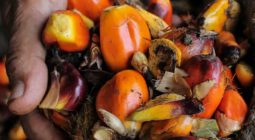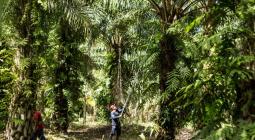Palm oil: why a ‘sustainable global supply’ chain needs to include smallholder farmers

To improve traceability and visibility across palm oil supply chains, it’s essential for industry and grassroots organisations to work together to ensure the smallholders producing the crop are not overlooked
If you look at an aerial shot of a palm oil plantation, it seems very much like a maze. Paths snake between row upon row of oil palm trees, with little in the way of biodiversity or landscape variability. To an outsider, the plantation appears vast, impenetrable and opaque – in some senses, mirroring the entire palm oil supply chain.
“It’s the most complex thing,” says Christine Schneider, a senior manager of sustainability and palm oil expert at the global consumer goods company Henkel. She adds that colleagues she has worked with for years still defer to her when they have questions around the palm oil supply chain. Schneider has 10 years’ experience in this field at Henkel, and is one of its “go to” experts.
Due to the supply chain’s complexity, understanding the needs, wants and struggles of those at the beginning of the chain – the farmers who produce and harvest the fruit – can be a long and winding path. This is particularly true for businesses that do not typically have direct contact with the farmers. What’s more, reaching those who work on smallholdings as opposed to larger plantations can be even more challenging, due to the often dispersed, informal nature of their work (they are unlikely to be part of organised networks).
But a significant proportion of palm oil is produced on smallholder farms – some 40% of the global total – so ensuring programmes and policies are in place to uphold fair working conditions for those farmers is crucial.

How is this being done?
One way is through certification. Marieke Leegwater, international programme coordinator for the non-profit Solidaridad, says palm oil smallholders generally lack high levels of financial or economic literacy. This means they are often not part of international sustainable sourcing certifications, such as that operated by the Roundtable on Sustainable Palm Oil (RSPO), which aim to help keep environmental and labour abuses in check.
Therefore, a certification specifically for them has been developed by the RSPO. Leegwater is the chair of the RSPO Smallholder Standing Committee and says she fought hard to get the new certification over the line. It was introduced in 2019, and although it’s much simplified, there’s still a lot to comply with for a fairly basic operation.
Certification centres around the “No deforestation, no peat, no exploitation” (NDPE) policies increasingly adopted by palm oil producers to create sustainable production. “But in order to demonstrate compliance,” says Leegwater, “you need quite an [organised] administration … a group management system.” Which smallholder communities often do not have. Nevertheless, progress continues and as of July this year, 55 independent smallholder groups have been certified, representing more than 460,000 hectares.
For large companies, certifications are a useful way to ensure the sustainability of the palm oil products they source. However, with a significant number of smallholders as yet uncertified, other methods are needed to encourage them to commit.

Henkel uses palm oil and especially palm kernel oil as the basis for ingredients in its laundry detergents, household cleaners and cosmetic products – but less than 0.2% of the total produced worldwide. As part of its commitment to sustainability, it has partnered with Solidaridad to build programmes that support smallholders not only to become certified, but to improve livelihoods and increase yields, while adhering to best agricultural practices and protecting nature.
Solidaridad, a non-profit organisation, acts as a bridge between workers in agricultural and mining supply chains, and the companies that rely on the fruits of their labour. This on-the-ground presence is crucial for Henkel, says Schneider, as it’s not something it could do on its own. “Leegwater is my sparring partner,” she says, referring to the close working relationship she has had with Leegwater for the past 10 years.
Through their work together, different projects to support smallholder livelihoods have been implemented in seven countries, including Colombia, Nigeria, Ghana and Indonesia. Besides establishing nurseries for new high-yield varieties of seedlings, women and young people are being trained in agribusiness and entrepreneurship.
Meanwhile, at the project in Colombia, it has taken five years to get to the point that Schneider says they have been “dreaming” about for a long time. They have successfully started linking the palm oil and palm kernel oil that is sourced from the smallholders there to one of their subcontractor sites in the US. “That’s our utmost goal,” she says. “That we are delivering our own supply.”
The project in Colombia is now moving to the next level. A mobile app called Farming Solution, which was developed by Solidaridad and supported by Henkel, offers the farmers taking part in the project tailored recommendations for more efficient and sustainable production. It also plays an important role in digitising the “last mile” in international supply chains, ensuring sustainable products from farm to shelf.
By being able to trace palm oil right back to the smallholders who picked the fruit to make it, the company has direct sight over how those workers are treated, and the practices used to grow the crop.
What other ways are there to ensure transparency within the supply chain? Katrin Feyerabend is the global head of sustainability purchasing for Henkel and says another mechanism is through its work with Action for Sustainable Derivatives (ASD), a cross-sector initiative that brings together companies in cosmetics, home and personal care, and oleochemical industries. “They really help us to map our supply chain to create transparency, which we ourselves as Henkel alone would not be in a position to do,” she says.
But there is still so much work to be done. Within the palm oil supply chain, ensuring more traceability is an important area of focus. By enhancing it, the visibility increases and with that labourer circumstances and livelihoods can be improved. Hopefully, through the cross-industry initiatives, partnerships, and, importantly, the will of dedicated employees, the farmers at the end of it all, are reached.
Click here to learn more about pioneering technologies that are driving sustainability in the palm oil supply chain
28 September 2021
The Guardian





